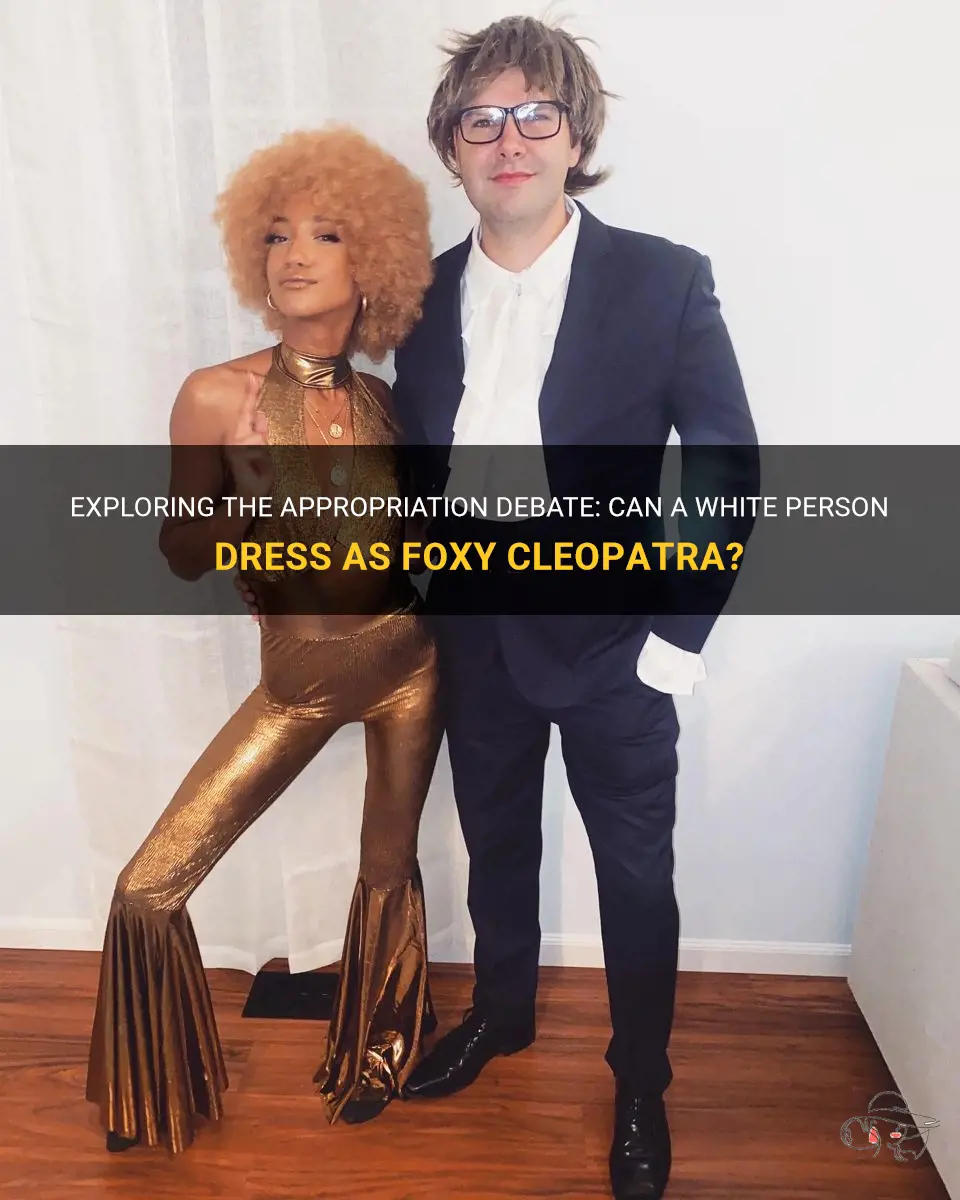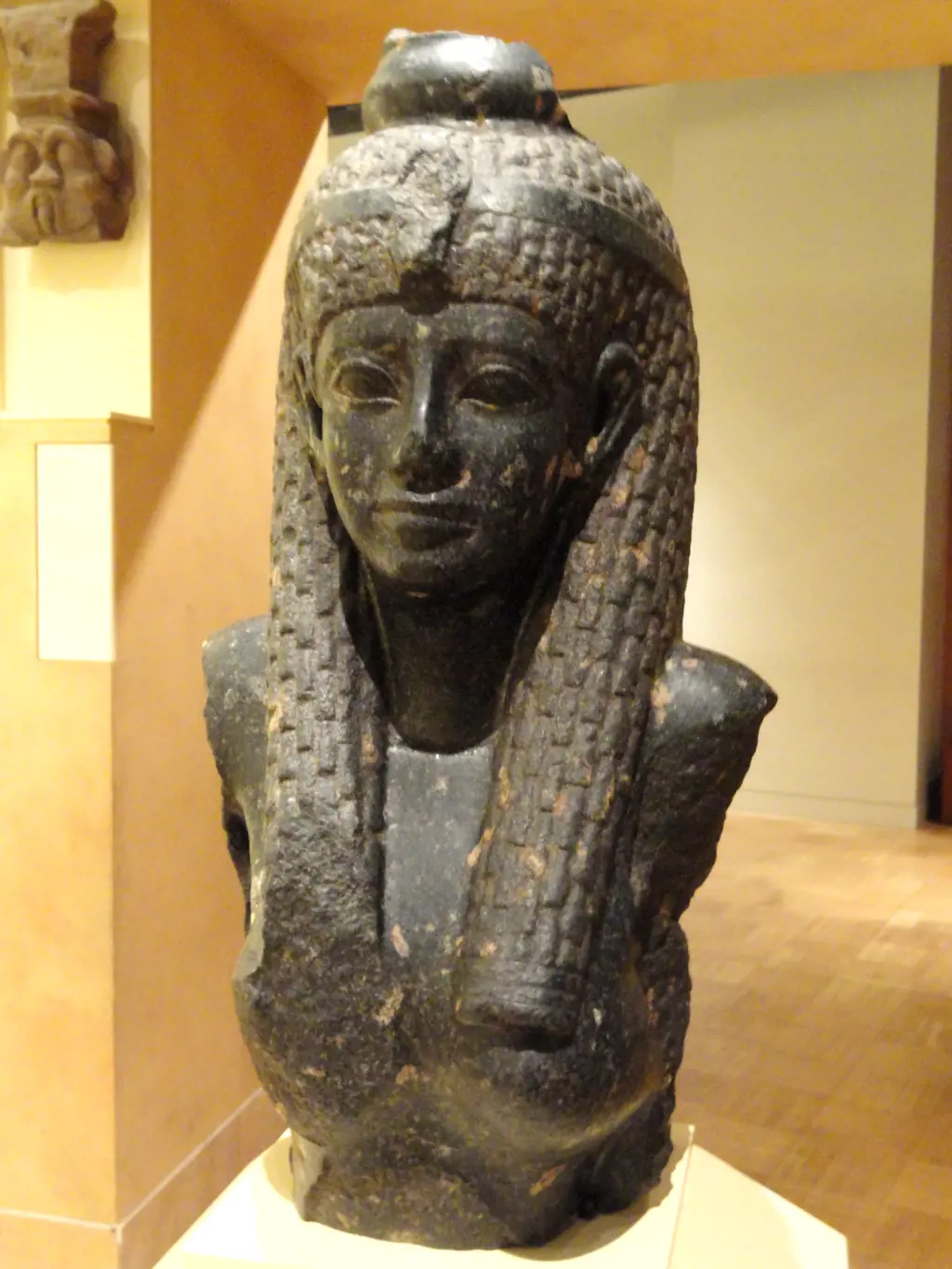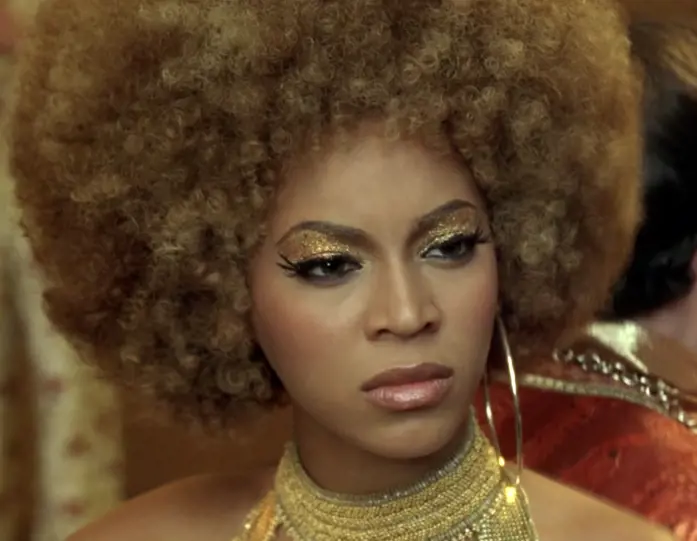
Can a white person dress as Foxy Cleopatra? The world of costume choices and cultural appropriation can be a complex and sensitive topic. On one hand, dressing up as a character can be seen as a fun and creative way to celebrate a beloved pop culture icon. However, when it comes to representing a specific culture or ethnicity, it's important to approach the subject with sensitivity and respect. Foxy Cleopatra, a character played by Beyoncé in the film Austin Powers in Goldmember, is an iconic and beloved character. While it's not inherently wrong for a white person to dress as Foxy Cleopatra, it is important to be mindful of context and avoid caricaturizing or mocking the culture and heritage associated with the character.
| Characteristics | Values |
|---|---|
| Race | White |
| Gender | Any gender |
| Costume | Foxy Cleopatra |
| Cultural Appropriation | Potentially |
| Historical Accuracy | Not accurate |
| Individual Intentions | May vary |
| Impact on Communities | Can be harmful |
| Relevance | Subjective |
| Personal Understanding | May require research |
| Sensitivity | Important to consider |
| Respect | Required |
What You'll Learn
- Is it culturally appropriate for a white person to dress as Foxy Cleopatra, a character from the movie Austin Powers in Goldmember?
- What are the potential implications and consequences of a white person dressing as this specific character?
- Are there any historical or cultural contexts surrounding Cleopatra that may make it offensive for a white person to portray her?
- Can a white person respectfully celebrate or appreciate Foxy Cleopatra without appropriating or misrepresenting the character or its cultural significance?
- How can individuals ensure they are not engaging in harmful cultural appropriation when choosing costumes for cultural or historical figures like Foxy Cleopatra?

Is it culturally appropriate for a white person to dress as Foxy Cleopatra, a character from the movie Austin Powers in Goldmember?

Cultural appropriation is a hotly debated topic, with people often having varying opinions on what is and isn't appropriate. One specific issue that often arises is whether it is culturally appropriate for a white person to dress as Foxy Cleopatra, a character from the movie Austin Powers in Goldmember. In order to fully explore this issue, it is important to consider multiple perspectives, both from a scientific standpoint and drawing from personal experiences.
From a scientific perspective, cultural appropriation occurs when a dominant culture borrows or adopts elements from a marginalized or minority culture without understanding or respecting its historical or cultural significance. When a white person dresses as Foxy Cleopatra, they are taking on the persona of a character played by a black actress. This raises questions about whether this is perpetuating racial stereotypes or trivializing black culture. It is important to consider the power dynamics at play and the historical context of racial inequality.
Drawing from personal experiences can provide valuable insight into the impact of cultural appropriation. Many black individuals view the act of a white person dressing as a black character as offensive and disrespectful. By imitating someone else's culture, it can be seen as diminishing the significance and struggles that are associated with it. It is crucial to listen and respect the feelings and opinions of those who belong to the culture being appropriated.
It is also important to consider the intentions behind the act of dressing as Foxy Cleopatra. If the intention is to celebrate and pay homage to the character or the film, it is essential to consider whether there are alternative ways to do so without appropriating another culture. For example, a white person could dress as another character from the movie or find a character from their own culture to emulate.
In order to fully assess the appropriateness of a white person dressing as Foxy Cleopatra, it is necessary to look at the broader context of cultural appropriation in popular culture. Instances of cultural appropriation are pervasive, and individuals should educate themselves on the topic in order to make informed decisions about their actions. It is important to understand that the impact of cultural appropriation extends beyond individual costumes, but contributes to broader social issues and inequalities.
To conclude, whether it is culturally appropriate for a white person to dress as Foxy Cleopatra depends on a variety of factors. It is important to consider the historical context of racial inequality, listen to the experiences and opinions of those who belong to the culture being appropriated, and assess the intentions behind the act of dressing as the character. By engaging in thoughtful reflection and dialogue, individuals can make informed decisions that promote cultural understanding and respect.
Upgrade Your Wife's Wardrobe: Simple Strategies to Help Her Dress Better
You may want to see also

What are the potential implications and consequences of a white person dressing as this specific character?

As society becomes more aware of issues related to cultural appropriation and racism, it is important to critically examine the potential implications and consequences of individuals, particularly white people, dressing as characters that do not align with their own cultural heritage. This article aims to explore the potential consequences of a white person dressing as a character from a different culture, and why this can be problematic.
Cultural Appropriation:
Cultural appropriation refers to the adoption or use of elements from another culture, often without understanding or respecting its historical, social, and cultural significance. For a white person to dress as a character from a different culture, it can perpetuate stereotypes and reinforce power imbalances. It can also disregard the nuanced meanings and symbolism behind cultural attire or specific costumes.
Reinforcing Stereotypes:
When a white person dresses as a character from a different culture, it can reinforce stereotypes and exoticize the culture being portrayed. This can perpetuate harmful narratives and contribute to the marginalization of marginalized communities. It is essential to recognize that cultural attire holds deep cultural and historical significance, and using it as a costume can trivialize its importance.
Misrepresentation and Loss of Authenticity:
Dressing as a character from a different culture can lead to misrepresentation and a loss of authenticity. It is crucial to respect and honor the traditions, symbols, and meanings of cultural attire by understanding its cultural context. When a white person dresses as a character from a different culture without understanding its historical and cultural significance, it can distort the message and meaning behind the attire.
Appropriating Sacred Symbols:
Many cultures have sacred symbols and attire that hold profound religious or spiritual meaning. For a white person to dress as a character from a culture they do not belong to, it can be disrespectful and offensive. It is vital to recognize the sacredness of these symbols and respect the wishes of communities that consider them sacred to avoid appropriating and commodifying their cultural heritage.
Contributing to Systemic Racism:
Dressing as a character from a different culture can contribute to systemic racism by perpetuating a power dynamic and allowing the dominant culture to appropriate and commodify elements of marginalized cultures. This can further marginalize communities and perpetuate harmful stereotypes that have been historically used to oppress them.
In conclusion, there are several potential implications and consequences of a white person dressing as a character from a different culture. It can perpetuate cultural appropriation, reinforce stereotypes, lead to misrepresentation and loss of authenticity, appropriate sacred symbols, and contribute to systemic racism. It is crucial to approach the act of dressing as characters from different cultures with sensitivity, respect, and a deep understanding of their cultural significance to avoid further marginalizing and exploiting marginalized communities.
Creating a Victorian Bustle Dress: Step-by-Step Guide to Achieve the Elegant Look
You may want to see also

Are there any historical or cultural contexts surrounding Cleopatra that may make it offensive for a white person to portray her?

While there are no explicit historical or cultural contexts that make it inherently offensive for a white person to portray Cleopatra, it is important to consider the historical and cultural significance of the Queen of Egypt. Cleopatra was a symbol of Egyptian power and heritage, and her story is deeply intertwined with the history and culture of ancient Egypt.
Cleopatra was the last active ruler of the Ptolemaic Kingdom of Egypt and is often depicted as a powerful and alluring queen. She is widely known for her relationships with Julius Caesar and Mark Antony, as well as her death by suicide. Throughout history, Cleopatra has been portrayed in various plays, movies, and television shows, with actresses of different ethnicities taking on the role.
However, it is worth noting that Cleopatra was an Egyptian queen, and Egypt is located in Africa. The depiction of Cleopatra as a white woman, particularly in Western media, has long been a subject of controversy. This controversy stems from a historical trend of whitewashing ancient Egypt and depicting its powerful figures as white, despite the fact that ancient Egyptians were generally of African descent.
By casting a white person in the role of Cleopatra, there is a risk of perpetuating this whitewashing narrative and erasing the true history and heritage of ancient Egypt. It can be seen as a missed opportunity to provide representation for actors of African descent, who are often marginalized in mainstream media.
Furthermore, the appropriation of Cleopatra's story by white actors can be seen as a form of cultural appropriation. Cultural appropriation refers to the adoption or use of elements from a different culture, often with little understanding or respect for the cultural context. In this case, a white person portraying Cleopatra without considering the cultural significance and historical context may be viewed as appropriating and commodifying Egyptian culture for their own gain.
It is important to note that there have been portrayals of Cleopatra by white actresses that are well-received and respectful of the historical background. These portrayals often strive to accurately depict the queen's story and emphasize her Egyptian heritage. However, sensitivity and awareness should be exercised when approaching such portrayals to ensure that they do not perpetuate harmful stereotypes or erase the contributions of African cultures.
In conclusion, while there is no explicit rule stating that a white person cannot portray Cleopatra, it is vital to consider the historical and cultural context surrounding the queen. Cleopatra's story is deeply tied to the history and culture of ancient Egypt, and her portrayal should be approached with sensitivity and respect. By being mindful of the historical trends of whitewashing and cultural appropriation, we can strive to accurately depict Cleopatra and provide representation for actors of African descent.
Exploring the Terrace 16 Dress Code: What to Wear and Not to Wear at this Elegant Rooftop Restaurant
You may want to see also

Can a white person respectfully celebrate or appreciate Foxy Cleopatra without appropriating or misrepresenting the character or its cultural significance?

Foxy Cleopatra is a character from the movie "Austin Powers in Goldmember," portrayed by American actress and singer Beyoncé. Foxy Cleopatra has become an iconic character, known for her stylish outfits, sassy personality, and significant cultural references to the African American community.
Appreciating and celebrating Foxy Cleopatra can be done by anyone, regardless of their race. However, it is important for white individuals to approach the character with respect and understanding, in order to avoid appropriating or misrepresenting the character or its cultural significance.
Here are some steps for a white person to respectfully celebrate or appreciate Foxy Cleopatra:
- Educate yourself: Before diving into celebrating or appreciating Foxy Cleopatra, take the time to educate yourself about the character and its cultural significance. Learn about the historical context of black women and the representation of black women in popular culture. Understand the cultural references and themes portrayed by Foxy Cleopatra.
- Avoid stereotypes: When celebrating or appreciating Foxy Cleopatra, it is important to avoid perpetuating stereotypes or caricaturing black culture. Foxy Cleopatra should be celebrated for her strength, sassiness, and style, rather than reduced to a stereotypical representation of black women.
- Show respect and appreciation: When discussing or referencing Foxy Cleopatra, do so with a genuine respect and appreciation for the character and Beyoncé's portrayal. Appreciate the talent, fashion choices, and charisma that made Foxy Cleopatra an iconic character. Avoid mocking or trivializing the character's cultural significance.
- Be mindful of cultural appropriation: Cultural appropriation occurs when elements of one culture are taken and used by members of another culture, often without understanding or respect for their cultural significance. If white individuals want to celebrate or appreciate Foxy Cleopatra, it is important to be mindful of not appropriating black culture. This means avoiding culturally inappropriate costumes, hairstyles, or language that may perpetuate stereotypes or offend the African American community.
- Support black artists and creators: Instead of simply celebrating or appreciating Foxy Cleopatra, take the opportunity to support black artists and creators. Explore music, films, literature, and art created by black individuals. Use your appreciation for Foxy Cleopatra as a starting point to engage with and appreciate the diverse and rich contributions of black culture.
It is possible for a white person to respectfully celebrate or appreciate Foxy Cleopatra without appropriating or misrepresenting the character or its cultural significance. By educating oneself, avoiding stereotypes, showing respect and appreciation, being mindful of cultural appropriation, and supporting black artists and creators, white individuals can navigate this celebration in a respectful and inclusive manner. It is essential to approach the character with an understanding of its cultural context and the importance of representation, ensuring that it is celebrated with authenticity and respect.
The Price Range of Victoria Kyriakides Dresses Revealed
You may want to see also

How can individuals ensure they are not engaging in harmful cultural appropriation when choosing costumes for cultural or historical figures like Foxy Cleopatra?

Cultural appropriation is a complex and sensitive issue that arises when individuals from one culture adopt or borrow elements from another culture without understanding or respecting its true significance. While cultural exchange and appreciation can be positive and enriching, it is important to approach it with sensitivity and respect. This is especially relevant when selecting costumes for cultural or historical figures, such as Foxy Cleopatra.
Here are some steps individuals can take to ensure they are not engaging in harmful cultural appropriation when choosing costumes:
- Educate yourself: Before selecting a costume, take the time to research and understand the cultural or historical significance behind the figure you want to portray. In the case of Foxy Cleopatra, she is a fictional character. However, she is based on the historical figure of Cleopatra, who was a prominent Egyptian queen. Learn about Cleopatra's legacy and significance in Egyptian history to gain a better understanding of the context.
- Avoid stereotypes: Stereotyping is a detrimental aspect of cultural appropriation. Costume choices should never perpetuate stereotypes or caricatures of a cultural or historical figure. Instead, focus on representing the person as accurately as possible, respecting their culture and heritage.
- Respect traditional attire: If you choose to wear traditional attire associated with the cultural or historical figure you are portraying, make sure to do so respectfully. Seek out expert guidance or consult individuals from that culture to ensure you are wearing the attire appropriately and without disrespecting sacred or ceremonial elements.
- Use your own culture: If you are unsure about appropriating a culture that is not your own, consider selecting a costume from your own cultural heritage. This eliminates the risk of cultural appropriation altogether while allowing you to celebrate and showcase your own culture.
- Engage in cultural exchange, not cultural theft: Cultural exchange involves a respectful and equal exchange of ideas and practices between different cultures. If you are inspired by a cultural or historical figure, incorporate elements in a way that acknowledges and gives credit to the source culture. This can be done through thoughtful research, educating others, or collaborating with individuals from that culture.
Examples of how these steps can be applied when choosing a Foxy Cleopatra costume:
- Educate yourself: Learn about the historical significance of Cleopatra as the last ruler of ancient Egypt. Familiarize yourself with her accomplishments, cultural contributions, and challenges she faced during her reign.
- Avoid stereotypes: Instead of adopting exaggerated features or costumes associated with ancient Egypt, focus on Cleopatra's distinctive characteristics, such as her intelligence, leadership skills, and wit.
- Respect traditional attire: If you choose to wear traditional Egyptian clothing as part of your Foxy Cleopatra costume, consult with experts or individuals from Egyptian culture to ensure you are wearing it in a respectful and accurate way.
- Use your own culture: If you do not have a personal connection to Egyptian culture, consider using elements from your own cultural background to create a unique Foxy Cleopatra costume. This allows you to celebrate your own heritage while still paying homage to Cleopatra's historical significance.
- Engage in cultural exchange: Instead of simply wearing a costume, use the opportunity to educate others about Cleopatra's history and cultural impact. Share the knowledge you have gained through your research and encourage others to appreciate and respect different cultures.
By following these steps, individuals can ensure that they are not engaging in harmful cultural appropriation when choosing costumes for cultural or historical figures like Foxy Cleopatra. It is essential to approach cultural exchange with sensitivity, respect, and a willingness to learn and grow.
Discover the Best Places to Find Mexican Dancer Dresses for Your Next Fiesta
You may want to see also
Frequently asked questions
Yes, a white person can dress as Foxy Cleopatra for a costume party. Costumes are a form of self-expression and creativity, and it is not limited by racial or ethnic boundaries. As long as the costume is worn respectfully and in good taste, anyone can dress as any character they choose.
Cultural appropriation is a sensitive topic, but dressing as a character like Foxy Cleopatra is typically not considered cultural appropriation. Foxy Cleopatra is not a representation of an entire culture, but rather a fictional character from the Austin Powers movies. However, it is still important to be mindful and respectful of cultural symbols and traditions when choosing and wearing a costume.
While there is no strict rule on altering one's appearance for a costume, it is generally not necessary for a white person to change their race or ethnicity to dress as Foxy Cleopatra. The character is recognizable based on her iconic hairstyle, fashion choices, and personality traits, which can be recreated without changing one's physical appearance.
To ensure a respectful Foxy Cleopatra costume, it is important to avoid cultural stereotypes or offensive depictions. Focus on replicating the character's style and personality rather than imitating or mocking a specific culture. Being aware of harmful stereotypes and taking the time to educate oneself about the character and its origins can help ensure a respectful portrayal.
It is important to separate the act of dressing as a fictional character from appropriating the struggles or experiences of a real culture or community. Foxy Cleopatra is a fictional character, and dressing as her does not inherently imply a claim to the experiences of Black people. However, it is still crucial to be mindful of racial sensitivities and avoid perpetuating harmful stereotypes while wearing the costume.







